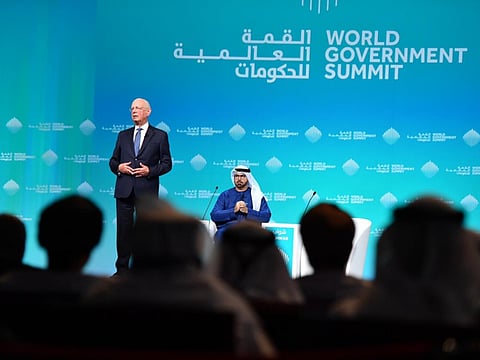Shape up, embrace ‘age of imagination’: Governments urged
World Government Summit opens with urgent call to nations to realign their goals

DUBAI: The seventh edition of the World Government Summit in Dubai began on Sunday morning with an emphatic call to governments across the globe to shape up and realign their goals in the context of Globalisation 4.0, or face the dire consequences of being left behind.
Arriving at the opening plenary session at 9am sharp, Mohammad Abdulla Al Gergawi, UAE Minister of Cabinet Affairs and the Future, welcomed the massive gathering and gave the floor to Professor Klaus Schwab, founder and executive chairman of the World Economic Forum (WEF), to deliver his keynote address.
Beginning his speech with what he described as “not good news”, Professor Schwab said: “The world is a system inter-composed by nation states, interdependent and interconnected.
"The question is not more or less globalisation, we all share a common future. But this global system is in danger of spinning out of control. And once out of control, the consequences are very dire.”
He said the global system is under tremendous stress. Among the major stress factors is speed of change. He said the world, which is moving from being unipolar and uniconceptual to multipolar and multiconceptual, is very fragile with many more actors in play.
“It’s not just about technological progress, there is a new wave of populism and people don’t want to be left behind anymore. They want social justice,” he said.
The professor said although Globalisation 3.0 lifted millions out of poverty, the question of winners and losers remained to be addressed. “We have to move to Globalisation 4.0 … which Is (in keeping) with a multi-polar world, more sustainable and inclusive as it gives people who have lost out a new vision… We have to move from crisis management to constructive management.”
He said this system will not be led by governments alone, but multi-stakeholders including women, youth, NGOs and businesses.
He said, “I feel recomforted when I come home from the UAE because it is one nation which provides vision for the future.”
Age of Imagination
In a hard-hitting speech, minister Al Gergawi spoke of the key transformations governments round the world had to prepare for.
Describing imagination and ideas as the commodities of the future, he said, “We are moving from the age of information to the age of imagination. Governments with their old thinking cannot impact the future. Those who own ideas and imagination, own the future.”
He said many governments were not up to date with developments of the fourth industrial revolution.
Today, companies compete with governments. They spend multiple times what governments spend on research and development.Mohammad Abdulla Al Gergawi, UAE Minister of Cabinet Affairs and the Future
“Today, companies compete with governments. They spend multiple times what governments spend on research and development,” he said, giving the examples of companies like Amazon, Apple and Google.
He said, the private sector has taken major leaps in almost all sectors, including space which in the 60s and 70s was completely controlled by the Government.
He said earlier, governments had information about its people through registered archives.
“Today this has drastically changed. The private sector knows much more about us than governments. They know what and when we eat, when we sleep, where we travel, which hotel we stay in, which airline and class we take … they even know the number of our heartbeats. Who owns the data owns the future.”
But that alone is not enough. He said governments should relook at their structures, tasks and future tasks, besides drafting new legislations in keeping with new developments like artificial intelligence and 3D printing.
Al Gergawi said governments would also do well to prepare for a projected shortage of 85 million jobs in the creative domain by 2030.
“We should teach our children the importance of creativity, imagination, design and the ability to transform this into reality,” he said, thankful to the Founder and Rulers of the UAE for imagining what they wanted their country to be, designing it accordingly and making it a reality.


